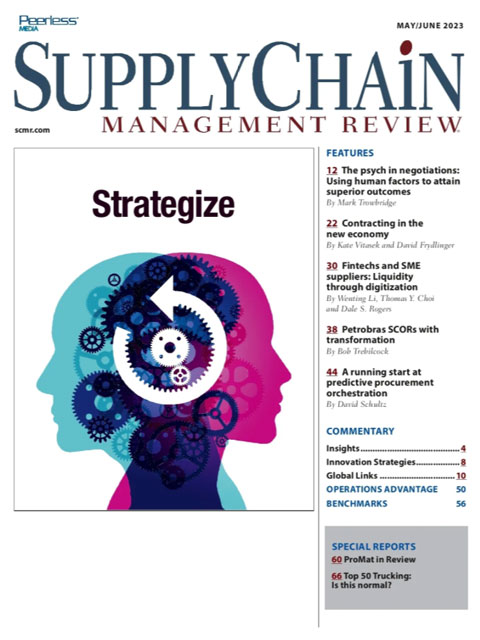Sorry, but your login has failed. Please recheck your login information and resubmit. If your subscription has expired, renew here.
May-June 2023
If you were dropped onto this planet and landed at McCormick Place in the heart of Chicago in the middle of March, you would probably conclude that planet Earth had been overrun by robots. Everywhere you turned on the ProMat conference floor, there was a robot lifting something, putting something away, or carrying something to another location. But, despite a conference hall overrun by technology, the on-the-ground reality is a bit different. Not so long ago, commercial real estate firm Prologis estimated the number of facilities with any type of automation at about 10%. But that is changing—quickly. A recent report from JLL found that one-in-two… Browse this issue archive.Need Help? Contact customer service 847-559-7581 More options
Politics notwithstanding, the Earth’s atmosphere is warming, and the warming curve is steepening. Increasingly severe and frequent weather events are taking a toll on lives and livelihoods as they disrupt agriculture, critical infrastructure and global supply chains.
Recent years have brought a string of unprecedented extreme weather events across the globe: heat waves and drought across the Indian subcontinent and parts of Europe; more devastating wildfire seasons in western U.S. states and Australia; intensifying monsoon rains and flooding across Southeast Asia and China; and record hurricanes, flooding and even freezing temperatures in the southern U.S. and Gulf of Mexico.
Regional events can often have global impacts, from crop shortages and higher food prices, to production shutdowns from power outages or water rationing. Unprecedented freezing temperatures in Texas and Louisiana in 2021, for example, shut down facilities producing automotive semiconductors and chemical resins critical to plastics manufacturing, resulting in months of global shortages.
Viewing such events as one-off, regional occurrences in isolation is no longer a comforting option. Organizations that fail to properly acknowledge and assess climate-related risks in their operations and take proper mitigating steps face not only potential direct climate-related damage and disruption but also increasing prices paid in carbon, lawsuits, reputational damage and lost business and investments over time.
Corporate boards and CEOs know they will need to strengthen the specific focus on decarbonization within their broader environmental, social and governance (ESG) objectives.
A major question is how best to manage the enormous challenge of climate resilience and emission reduction—both within and outside the organizational boundaries.

This complete article is available to subscribers only.
Log in now for full access or start your PLUS+ subscription for instant access.
SC
MR
Sorry, but your login has failed. Please recheck your login information and resubmit. If your subscription has expired, renew here.
May-June 2023
If you were dropped onto this planet and landed at McCormick Place in the heart of Chicago in the middle of March, you would probably conclude that planet Earth had been overrun by robots. Everywhere you turned on the… Browse this issue archive. Access your online digital edition. Download a PDF file of the May-June 2023 issue.Politics notwithstanding, the Earth’s atmosphere is warming, and the warming curve is steepening. Increasingly severe and frequent weather events are taking a toll on lives and livelihoods as they disrupt agriculture, critical infrastructure and global supply chains.
Recent years have brought a string of unprecedented extreme weather events across the globe: heat waves and drought across the Indian subcontinent and parts of Europe; more devastating wildfire seasons in western U.S. states and Australia; intensifying monsoon rains and flooding across Southeast Asia and China; and record hurricanes, flooding and even freezing temperatures in the southern U.S. and Gulf of Mexico.
Regional events can often have global impacts, from crop shortages and higher food prices, to production shutdowns from power outages or water rationing. Unprecedented freezing temperatures in Texas and Louisiana in 2021, for example, shut down facilities producing automotive semiconductors and chemical resins critical to plastics manufacturing, resulting in months of global shortages.
Viewing such events as one-off, regional occurrences in isolation is no longer a comforting option. Organizations that fail to properly acknowledge and assess climate-related risks in their operations and take proper mitigating steps face not only potential direct climate-related damage and disruption but also increasing prices paid in carbon, lawsuits, reputational damage and lost business and investments over time.
Corporate boards and CEOs know they will need to strengthen the specific focus on decarbonization within their broader environmental, social and governance (ESG) objectives.
A major question is how best to manage the enormous challenge of climate resilience and emission reduction—both within and outside the organizational boundaries.
SC
MR


More Sustainability
- How technological innovation is paving the way for a carbon-free future in logistics and supply chains
- Logistics key to supercharging EV battery recycling
- NextGen Supply Chain Conference set for October 21-23
- Why global businesses must consider climate change risks to their supply chains
- Estée Lauder, Schneider Electric and S&S Activewear to receive NextGen End User awards
- 2024 Robotics Application Conference announces session, speaker lineup
- More Sustainability
Latest Podcast

 Explore
Explore
Topics
Procurement & Sourcing News
- Three frameworks for creative problem-solving in supply chain
- Mitigating geopolitical uncertainty: 4 essential tactics for industrial CSCOs
- Supply chain strategy for medical devices: A Q&A with industry expert Sanjay Gupta
- Inventory Management and the Supply Chain: Outlook 2025
- How technological innovation is paving the way for a carbon-free future in logistics and supply chains
- Parcel shipping spend: The untamed holdout in today’s supply chains
- More Procurement & Sourcing
Latest Procurement & Sourcing Resources

Subscribe

Supply Chain Management Review delivers the best industry content.

Editors’ Picks





